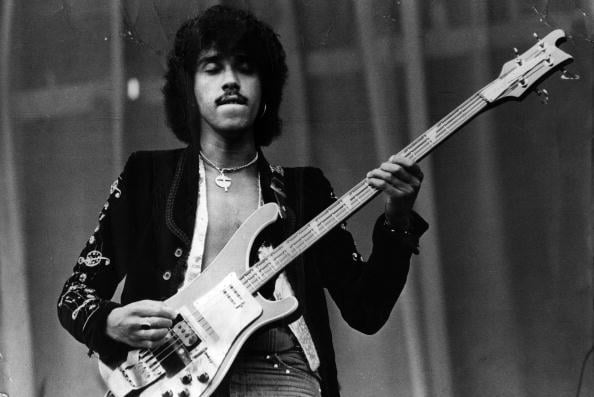What was Phil Lynott's Net Worth?
Phil Lynott was an Irish musician and songwriter who had a net worth of $500 thousand at the time of his death, best known as the co-founder, lead vocalist, bassist, and main songwriter of the rock band Thin Lizzy. With the band, he had such hit songs as "Whiskey in the Jar," "The Boys Are Back in Town," "Jailbreak," and "Waiting for an Alibi." After Thin Lizzy disbanded in 1983, Lynott formed the band Grand Slam.
Early Life and Education
Phil Lynott was born on August 20, 1949 in West Bromwich, England to Irish mother Philomena and Guyanese-British father Cecil. Growing up, he attended school in the Moss Side neighborhood of Manchester. However, due to racism in England and the fact that Lynott was of mixed race, he was sent to live with his grandparents in Dublin, Ireland in 1957. There, he attended the Christian Brothers School.
First Bands
In 1965, Lynott joined his first band, the Black Eagles. He served as the lead vocalist of the band, which played cover songs in clubs throughout Dublin. After that band fell apart, Lynott briefly played with the group Kama Sutra. He went on to form the blues rock band Skid Row with bassist Brendan Shiels in 1968. After his time with that group, Lynott formed the band Orphanage with drummer Brian Downey, guitarist Joe Staunton, and bassist Pat Quigley.
Thin Lizzy
Toward the end of 1969, Lynott formed the rock band Thin Lizzy with guitarist Eric Bell, keyboardist Eric Wrixon, and drummer Brian Downey, his former bandmate. The band released its first single, "The Farmer," in the summer of 1970. After that, Wrixon left the group. Thin Lizzy went on to release its self-titled debut studio album in 1971. That was followed by "Shades of a Blue Orphanage" in 1972. The same year, due to a desperate need for money, Thin Lizzy recorded an album of Deep Purple covers under the name Funky Junction. In 1973, the band had its breakout single with its rock version of the traditional Irish song "Whiskey in the Jar." However, Thin Lizzy's subsequent singles were far less successful, and after the departure of Bell, the band was on the brink of collapse by mid-1974. Following the recruitment of guitarists Scott Gorham and Brian Robertson, Thin Lizzy released the album "Nightlife," and then "Fighting," which became the group's first album to chart in the UK.
Thin Lizzy rose to international stardom in 1976 with its sixth studio album, "Jailbreak." Fueled by the hit singles "The Boys Are Back in Town" and the title track, the album reached number ten on the UK Albums Chart and number 18 on the US Billboard 200. Moreover, it was certified Gold in the UK, US, and Canada. Following this huge success, Thin Lizzy went on a number of world tours and released a series of hit albums, including "Johnny the Fox," "Bad Reputation," and "Black Rose: A Rock Legend." The band also put out the live album "Live and Dangerous," its last to feature Brian Robertson. With new guitarist Snowy White, Thin Lizzy released the album "Chinatown" in 1980. The band began struggling commercially in the years after that, while Lynott was showing signs of substance abuse. Following the releases of "Renegade" and "Thunder and Lightning," Thin Lizzy disbanded in 1983.

Getty Images
Later Musical Projects
Lynott started working on projects outside of Thin Lizzy in the late 1970s. He was featured on the album "Jeff Wayne's Musical Version of the War of the Worlds," and performed sessions for various other musicians. Lynott was also inspired by the punk rock movement to form the ad-hoc group the Greedies. In 1980, he embarked on a solo career with the album "Solo in Soho," which featured appearances by many of his current and former Thin Lizzy bandmates. A solid hit in the UK, the album spawned the singles "Dear Miss Lonelyhearts" and "King's Call." Lynott released his second and final solo album, "The Philip Lynott Album," in 1982. Meanwhile, he collaborated often with his former bandmate Gary Moore, appearing on a number of Moore's singles.
In 1984, Lynott formed a new band called Grand Slam, with Laurence Archer, Robbie Brennan, Doish Nagle, and Mark Stanway. However, dubbed by many as a poor man's version of Thin Lizzy, the group split up at the end of the year amid financial troubles and Lynott's worsening heroin addiction. Lynott released his final single, "Nineteen," a few weeks before his passing in early 1986. It was cowritten by Mark Stanway and Laurence Archer, and was produced by Paul Hardcastle. Lynott performed the song live on a number of television shows throughout December of 1985.
Personal Life and Death
Lynott married Caroline Crowther, the daughter of comedian, actor, and television personality Leslie Crowther, in early 1980. They had two daughters named Sarah and Cathleen. In 1984, the marriage fell apart amid Lynott's worsening substance abuse. Earlier in his life, Lynott had had a son who was put up for adoption.
Affected by severe substance abuse, including dependencies on heroin and alcohol, Lynott collapsed in his home on Christmas in 1985. Driven by his wife to a drug clinic, he was subsequently taken to the Salisbury Infirmary, where it was discovered he was suffering from septicemia. His condition declined over the ensuing days, and he was placed on a ventilator. On January 4, 1986, Lynott died from the effects of septicemia.
/2017/01/GettyImages-3278535.jpg)
/2018/12/tl-1.jpg)
/2010/11/billy-duffy-1.jpg)
/2014/07/GettyImages-950497680-e1599326567914.jpg)
/2014/06/GettyImages-492857474.jpg)
/2014/01/GettyImages-52134539.jpg)
/2020/07/mlp.jpg)
/2010/01/Deryck-Whibley.jpg)
/2020/07/jl.jpg)
/2010/01/GettyImages-183679600.jpg)
/2022/10/Anne-Murray.jpg)
/2014/09/Kim-Delaney.jpg)
/2009/11/Tim-Duncan.jpg)
/2023/01/lance-armstrong.jpg)
/2021/04/Sara-Gilbert.jpg)
/2025/03/Kelli-Ferrell.jpg)
/2010/05/Jaleel-White.jpg)
/2017/01/GettyImages-3278535.jpg)
/2018/12/tl-1.jpg)
/2014/07/GettyImages-950497680-e1599326567914.jpg)
/2015/05/gc2.jpg)
/2014/06/GettyImages-492857474.jpg)
/2010/11/billy-duffy-1.jpg)
/2012/12/eric-burdon-1.jpg)